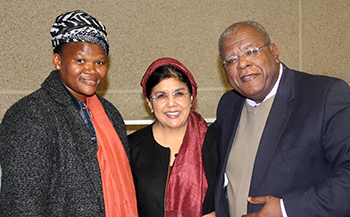Latest News Archive
Please select Category, Year, and then Month to display items
11 September 2024
|
Story Anthony Mthembu
|
Photo Anthony Mthembu and Chelsea Carolus
 From the left: Geraldine Lengau, Senior Officer in the Unit for Institutional Change at the UFS; and Oratile Reina, West College Prime.
From the left: Geraldine Lengau, Senior Officer in the Unit for Institutional Change at the UFS; and Oratile Reina, West College Prime.
As part of the initiatives lined up for College Week, the student leaders of West College at the University of the Free State (UFS) hosted a dialogue that primarily focused on discussing social justice as a value of Vision 130. The dialogue was held at Outeniqua Residence on 3 September 2024 and was well attended by students within West College.
According to Oratile Reina, West College Prime, “the motivation for the dialogue was to prepare newly elected leaders and our college community to align their efforts with Vision 130 – a vision that aims to create a more inclusive, equitable, and socially just environment on campus”. As such, she highlights that the dialogue was an opportunity for leaders to discuss practical strategies for implementing these values in their respective spaces, and to encourage those in West College to become better citizens inside and outside the university.
A conversation on social justice
The dialogue was facilitated by Geraldine Lengau, Senior Officer in the Unit for Institutional Change and Social Justice at the UFS. Lengau touched on several aspects pertaining to the topic of discussion. Firstly, she allowed the audience to give their definition of social justice, especially as students within the institution. In addition, she went on to talk to the audience about sexual assault in the context of social justice. In this instance, Lengau gauged whether the students knew which processes to follow in the event of a sexual assault incident, and whether they were acquainted with the UFS Sexual Harassment, Sexual Misconduct, and Sexual Violence Policy. Furthermore, the audience was given the opportunity to outline what social justice looks like to them in the spaces they occupy, including in their respective faculties, the sports they play, and the leadership structures they form part of. “I was encouraged to see that students take their right to a socially just university in very high regard, and that they were willing to break it down from what Vision 130 proposes, in order to align it with their common understanding,” said Lengau.
As the dialogue concluded, the audience signed a pledge committing to uphold the values of Vision 130. According to Reina, “The pledge represents a promise to take concrete steps towards fostering an inclusive and equitable campus culture. By signing the pledge, the leaders are not only agreeing to embody these principles in their leadership roles but are also holding themselves accountable to their peers and the broader university community.”
Beauty personified through written word
2016-07-29

Dr Thozama April, University of Fort Hare
historian, Zubeida Jaffer, current Writer-in-Residence
in the Department of Communication Sciences
at the UFS and author of Beauty of the Heart:
The life and times of Charlotte Mannya Maxeke
and Prof Jonathan Jansen, Vice-Chancellor and Rector
of the UFS at the book launch of Zubeida Jaffer.
Photo: Rulanzen Martin
“It is quite easy to write a book in a professional capacity but very difficult to write a book from the heart.”
These were the words of Prof Jonathan Jansen, Vice-Chancellor and Rector of the University of the Free State (UFS), at the launch of Beauty of the Heart: The life and times of Charlotte Mannya Maxeke by Zubeida Jaffer, the current Writer-in-Residence in the Department of Communication Sciences at the UFS.
Perseverance and dedication yields results
Writing a book from the heart is exactly what Jaffer, an award-winning South African journalist and author, set out to do. “When you make the choice to write a story, you need to be very dedicated,” she said.
As this is Jaffer’s third book, one would think that she would have no difficulty in putting pen to paper. On the contrary, she mentioned that it was, in fact, the hardest book she has written because the narrative was not easy to get hold of.
“I wanted Charlotte’s voice to come through, and it took my team and I three years of research and writing,” she said.
Maxeke’s story helps to shape South African society
The three-person panel, hosted by the UFS Sasol Library and SUN MeDIA, and chaired by Prof Jansen, included Jaffer and Dr Thozama April, University of Fort Hare historian who had done her PHD thesis on Maxeke.
Dr April said that Maxeke’s life story is an inspiring one, as it encourages a rethinking of established narratives. “These established narratives have made it possible for historians and researchers to write about the shaping of South African society,” she said.